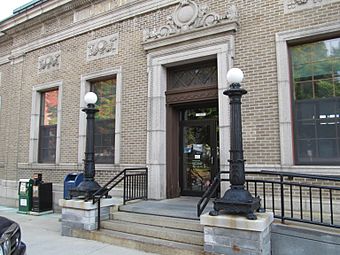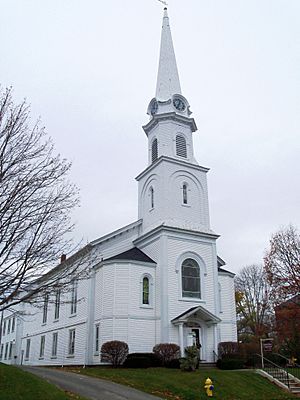Chestnut Street Historic District (Camden, Maine) facts for kids
Quick facts for kids |
|
|
Chestnut Street Historic District
|
|

The Camden Post Office, October 2012
|
|
| Location | Chestnut Street from Elm Street to Beacon Avenue, including parts of Penobscot Avenue, Pleasant and Wood streets, and Dillingham Point Camden, Maine United States |
|---|---|
| Area | 60 acres (24 ha) |
| Architectural style | Greek Revival, Queen Anne, Federal |
| NRHP reference No. | 91000325 |
| Added to NRHP | March 22, 1991 |
The Chestnut Street Historic District is a special area in Camden, Maine, United States. It's mostly a neighborhood with many homes that show how the town has changed over time. This district helps us understand Camden's history, from being a busy shipping town to a popular summer vacation spot. The district starts near the town center and stretches south along Chestnut Street, then east towards Dillingham Point. It was officially added to the National Register of Historic Places in 1991.
Discovering the Chestnut Street Historic District
Camden is a town located on the coast of Maine. It sits where the Megunticook River meets Penobscot Bay. People first settled here in the 1760s. However, the town really started to grow after the American Revolutionary War in the 1780s.
In its early days, Camden was famous for building ships. Later, in the mid-1800s, another important business was quarrying, which means digging up lime from the ground. As time went on, both shipbuilding and lime quarrying became less common. By the late 1800s, Camden started to become a popular place for summer visitors. This change helped the town grow in a new way.
Exploring the Historic Homes
Chestnut Street runs southeast from the town common. It follows along the river, above Bay View Road. This area was once farmland when Camden was first settled. Today, you can find some of Camden's oldest buildings here. Many of these old homes are on Wood and Pleasant Streets. These streets were part of a new neighborhood built just south of the common.
As Camden grew, more homes were built along Chestnut Street. Many of these houses are from the mid-1800s. They show off styles like Greek Revival and Italianate architecture. These styles were very popular for homes back then.
The first summer homes in Camden were built at Dillingham Point. This area is at the southern tip of the river's mouth. These early summer houses appeared in the 1880s. Today, you can see beautiful Shingle style houses there. Also at Dillingham Point is the Ogier house. This brick house was built in the 1830s. It was one of the first homes in the area. Later, it was also turned into a summer house.
 | Claudette Colvin |
 | Myrlie Evers-Williams |
 | Alberta Odell Jones |




